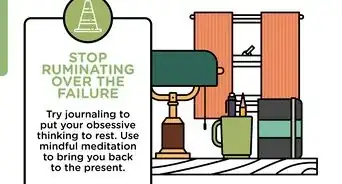This article was co-authored by Tasha Rube, LMSW. Tasha Rube is a Licensed Social Worker based in Kansas City, Kansas. Tasha is affiliated with the Dwight D. Eisenhower VA Medical Center in Leavenworth, Kansas. She received her Masters of Social Work (MSW) from the University of Missouri in 2014.
There are 8 references cited in this article, which can be found at the bottom of the page.
This article has been viewed 67,657 times.
Handling chronic complainers can indeed be a very difficult task. There are some people who seem to never be happy about anything in life: they could be friends, relatives, co-workers, you name it. Their dissatisfaction is chronic because it happens on a regular basis: to them, complaining is an attitude toward life rather than a reaction to a specific situation that has not gone according to their plans. There are some strategies you can implement to deal with their constant negativity without letting it affect your own peace of mind.
Steps
Dealing with a Chronic Complainer in a Specific Situation
-
1Avoid trying to convince a complainer that things aren't as bad as they seem. No matter what you say or do, the chronic complainer won't cheer up. Trying to convince them to think positively will only lead them to complain more to counteract your optimism.[1]
- Coming up with encouraging propositions like "Time heal all wounds" or "You're going to be fine" is only a waste of energy and will not stop their complaining.[2]
- This is technically known as "a polar response": their automatic reaction is to highlight the opposite of what you just said. Think of all the times when you're saying "It's not that bad" was met with a "Well, it is!", followed by a countless number of reasons why it is.[3]
-
2Fake sympathy and redirect them to what they should do. A complainer is really after sympathy, not solutions. Giving them what they want (a person who "truly gets how bad the situation is") will curb their attitude if not stop the complaining. However, make sure your expression of sympathy is followed by an active encouragement to get back to the task at hand "That must have been horrible for you! However, we need to get back to work now, otherwise we'll be late."
- Don’t be sarcastic when you express sympathy. Try to make it sound as sincere as possible.[4]
- A good way of expressing sympathy without agreeing is to say "This must be a huge problem for you." This remark doesn't acknowledge the fact that their problem is objectively a huge problem for you or the whole of humanity. It probably isn't. However, it does show you sympathize with how bad they think it is.
Advertisement -
3Try not to come up with solutions to their problem. This will make them dependent on you and persuade them to come back to you whenever they need a quick solution to their problems, or a punching bag to take out their negativity on. [5]
- It's easy to fall into the temptation of putting an end to the complaint by suggesting a solution. However, keep in mind that solutions are not really what they're after.
- Seeing hardship in every situation is part of a chronic complainer's identity: resourcefulness will be perceived as a threat to who they are and lead them to another outpouring of negativity to bolster their sense of self.[6]
-
4Ask them whether they thought of possible solutions to their problems. Instead of giving them solutions, asking something along the line of "That must be really hard for you! Do you have any solution in mind?" will break the flow of complaints and help them embrace a problem-solving approach.[7] [8]
- Because complaining is an essential identity-defining factor of a chronic complainer's personality, encouraging them to find solutions themselves won't necessarily change their attitude. However, it will stop the complaints because what you're asking of them is not another reason why all is bad, but whether they thought of how to change this.
- A possible negative answer to this question would be "There is no solution!" If that happens, explain briefly that complaining won't solve the problem either: "Well, complaining won't make it any better. It will just make you feel worse about something you can't change anyway."
-
5Make a distinction between chronic and authentic complaints. Although complaints coming from a chronic complainer are usually false alarms, there are instances in which the complaint is legitimate and might require your help in finding a solution to a real problem. In this case only, your advice could actually put an end to the complaint.[9]
- You'll have to use your judgment and personal knowledge of the chronic complainer to determine which complaints are legitimate and which are only expressions of generalized negativity. Chances are that the complaint, when it is real, will be phrased differently or accompanied by deeper concern.
Dealing with a Chronic Complainer in the Long Run
-
1Make an effort not to ignore their complaints completely. This will only encourage them to complain more often and loudly to make their voices heard.
- Chronic complainers are attention-seekers, and denying such attention will only worsen their attitude.
-
2Ask yourself why this person is complaining with you and not someone else. If the chronic complainer seems to be coming to you on a regular basis whenever their negativity needs an outlet, there might be a possibility that you've been selected as their favorite listener or problem-solver.[10]
- Consider what you've done in the past that might have prompted them to think you're more sympathetic than others and change your response. For example, you might have given too much space to their complaint and too little to helping them focus on finding solutions themselves.[11]
- Setting clear boundaries will contain their behavior. You will have to do it more than once until they've realized you're not the go-to person for their complaints. You can say "I love you and want to help, but I'll not just stay here and listen to how bad things are. If you want to think of solutions, you know where to find me." [12]
-
3Show your positive attitude as an alternative example. Although it's hard for chronic complainers to change their take on life, positivity can be as contagious as negativity. Showing how you deal with problems yourself could work as evidence of the fact that there are different ways to approach life, and help the complainer change their attitude.
-
4Talk to them openly about their chronic complaining. If the number and intensity of chronic complaints has gotten out of control and you consider this person a friend, you should discuss their attitude and point out that their complaining is a default reaction to any situation, rather than a reasonable behavior.
- Chronic complainers don't see themselves as negative people. They think life is especially harsh for them because of bad luck or honestly think problems are too huge for them to handle. Your helping them see this side of their personality will be a first step toward their acting upon it.
Protecting Yourself from a Chronic Complainer
-
1Realize you are not truly responsible for what they are complaining about. It's easy to think a complaint is due to something you did wrong. Although this might the case in some circumstances, chronic complainers will use complaint as a default reaction to any aspect of life. The problem is not with what you have done, but with how they handle life in general.
- Don't allow the complaint to become a reality for you. Seeing faults in your own behavior won't improve the situation but only let their negativity affect you.
-
2Don't let the complaints become contagious. It's easy to fall into the trick of letting a complainer's attitude toward life have an influence on our own way of looking at things. In fact, it's much more likely to be affected by negative vibes than positive ones: after all, fear and suspicion are part of our survival instinct.[13]
- This doesn't mean pretending that the world is all rainbows and unicorns. Having a positive attitude means keeping your focus on solutions instead of dwelling on problems and address them directly, instead of letting them overwhelm you.[14]
- In order to contain a complainer's impact on your own and other people's life, don't let them take the lead. This is especially true if the complainer is in the workplace or part of a team. If you act as a positive leader, the complainer's pessimism will be neutralized, or spread at a slower pace.
-
3Keep them at a distance if their complaining is affecting your life. If nothing has worked and the constant complaining has begun to impact your own attitude toward life, the last resort is loosening your relationship with the chronic complainer.
- This can be hard if the complainer is someone on your workplace or in your family. In this case, you should do your best to think of other strategies before cutting them off.
- You can also enjoy the company of this person when they're in a good mood and walk out on them only when they phase into a negative mode.[15]
Warnings
- Don't complain to other people about the chronic complainer's complaining. This will make you into a complainer yourself and start a vicious cycle of negativity that won't do any good to any of you.⧼thumbs_response⧽
References
- ↑ https://www.psychologytoday.com/blog/the-squeaky-wheel/201107/how-deal-chronic-complainers
- ↑ http://positivesharing.com/2006/08/a-devious-trick-to-handle-chronic-complainers/
- ↑ http://www.selfgrowth.com/articles/silencing-the-chronic-complainer
- ↑ https://www.psychologytoday.com/blog/the-squeaky-wheel/201107/how-deal-chronic-complainers
- ↑ https://www.youtube.com/watch?v=89kRw938zLo
- ↑ https://www.psychologytoday.com/blog/the-squeaky-wheel/201107/how-deal-chronic-complainers
- ↑ https://www.youtube.com/watch?v=89kRw938zLo
- ↑ https://www.psychologytoday.com/us/blog/the-squeaky-wheel/201107/how-deal-chronic-complainers
- ↑ https://www.psychologytoday.com/blog/the-squeaky-wheel/201107/how-deal-chronic-complainers
- ↑ https://www.youtube.com/watch?v=89kRw938zLo
- ↑ https://www.psychologytoday.com/us/blog/the-squeaky-wheel/201107/how-deal-chronic-complainers
- ↑ http://www.selfgrowth.com/articles/silencing-the-chronic-complainer
- ↑ https://www.psychologytoday.com/blog/high-octane-women/201210/emotions-are-contagious-choose-your-company-wisely
- ↑ https://www.psychologytoday.com/us/blog/mindful-anger/201701/6-steps-transform-your-outlook
- ↑ https://www.psychologytoday.com/blog/the-squeaky-wheel/201107/how-deal-chronic-complainers







































































